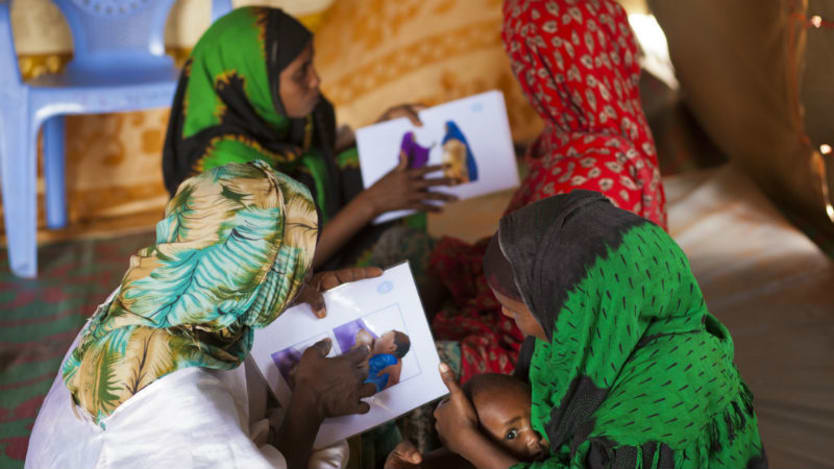Breast-feeding in emergencies: A question of survival

Kitham is a Syrian refugee in Jib Janine, in Lebanon’s Bekaa Valley. When she gave birth last May to her sixth child, the doctors didn’t let her feed him for several days due to health complications. Weeks later, as her baby’s health deteriorated, Kitham carried him on foot to seek help at the nearest health center, where medical consultants feared he might not make it. Baby Manhal was hospitalized for three weeks, during which time his mother was able to start breast-feeding him.
Manhal was one of the luckier ones, but an estimated 820,000 children die every year because they were not breast-fed in line with WHO recommendations: fed nothing but breast milk for six months and then continued breast-feeding with other foods until 2 years old. A child who is not breast-fed for his or her first six months of life is more than 14 times more likely to die compared to a baby who gets breast milk only. Breast-feeding has major benefits for mothers’ health too, by reducing rates of breast cancer, ovarian cancer, and type 2 diabetes.
Breast-feeding becomes even more critical for survival in humanitarian emergencies, where young children are among the most vulnerable. They face risks from diarrhoeal diseases, pneumonia and undernutrition. Overcrowding, food insecurity, unsafe water, poor sanitation, and overburdened health systems all contribute to a more dangerous situation for infants and children. Failure to fully protect breast-feeding in these circumstances dramatically worsens the situation.
All too often, breast-feeding is overlooked as a key lifesaving intervention, especially in emergencies. At next week’s first World Humanitarian Summit in Istanbul, we must make sure that breast-feeding is considered in funding, planning and implementing emergency responses.
Understanding the challenges
Humanitarian emergencies pose special challenges for protecting, promoting and supporting breast-feeding. First, uncontrolled distribution of breast milk substitutes (including infant formula) is often a problem. Well-meaning donors may send supplies of breastmilk substitutes to feed starving children, not realizing that infants and children who are not breast-fed are vulnerable to infection and to developing diarrhoea. Feeding with breast milk substitutes always carries risks, and these are heightened in emergencies since there may be no clean water with which to make up infant formula or to clean bottles and teats. Breast milk substitutes should only be used as a last resort.
Second, breast-feeding support is often unavailable in emergencies. Health workers who are trained in breast-feeding counseling and lactation management are not often deployed to direct emergency response activities.
Third, emergencies often lead to displacement and crowded living conditions. It may be difficult for mothers to find comfortable, private places to breast-feed.
Goals for the World Humanitarian Summit and beyond
• Increase awareness among the humanitarian community that, however well-intentioned, unsolicited donations of infant formula, bottles and artificial teats in emergency settings put babies’ lives at risk.
• Quash the common misconception that mothers cannot breast-feed adequately in stressful settings or if they have poor nutrition.
• Ensure that financial and human resources dedicated to supporting breast-feeding are part of their emergency preparedness plans and that special attention is given to the care and nutrition of women who are pregnant or breast-feeding. In emergencies where not enough nutrient-rich food is available, these women should be given vitamin and mineral supplements.
• Reduce reliance on international assistance and build community resilience.
• Create multiple communication channels to reach mothers and their family members with messages on the importance of continued breast-feeding and the dangers of using breast milk substitutes.
Examples of success
Save the Children Jordan established mother-baby friendly spaces in caravans and promoted them as safe havens for breast-feeding, where privacy and support were provided for all pregnant women and mothers with children under the age of 5. More than 15,000 mothers in Za’atari camp benefited from caravan and tent counseling sessions between December 2012 and May 2014. Similar examples exist in the Macedonia, Serbia and Croatia where UNICEF and its partners established specialized mother-and-baby spaces.
Following the devastating earthquakes in 2015 in Nepal, the government provided a comprehensive response to ensure the protection, promotion and support of breast-feeding, including a statement emphasizing the importance of breast-feeding and banning the general distribution of breast milk substitutes.
Within six months, more than 20 mother-baby sites were established in community camps to provide suitable space for breast-feeding mothers and almost 160,000 mothers of children under the age of 2 received breast-feeding counseling. Radio Nepal and community and private radio stations reached 380,000 families with information on the benefits of breast-feeding, the risks of breast milk substitutes and other key nutrition messages.
One of the key issues up for discussion at the WHS will be how to reduce reliance on international assistance and build community resilience. Promoting and supporting breast-feeding is a perfect example of something that countries can do to, not only save lives in emergencies, but to give children who are having such a difficult start in life a much better chance for a brighter future.
Join the Devex community and access more in-depth analysis, breaking news and business advice — and a host of other services — on international development, humanitarian aid and global health.
Search for articles
Most Read
- 1
- 2
- 3
- 4
- 5

